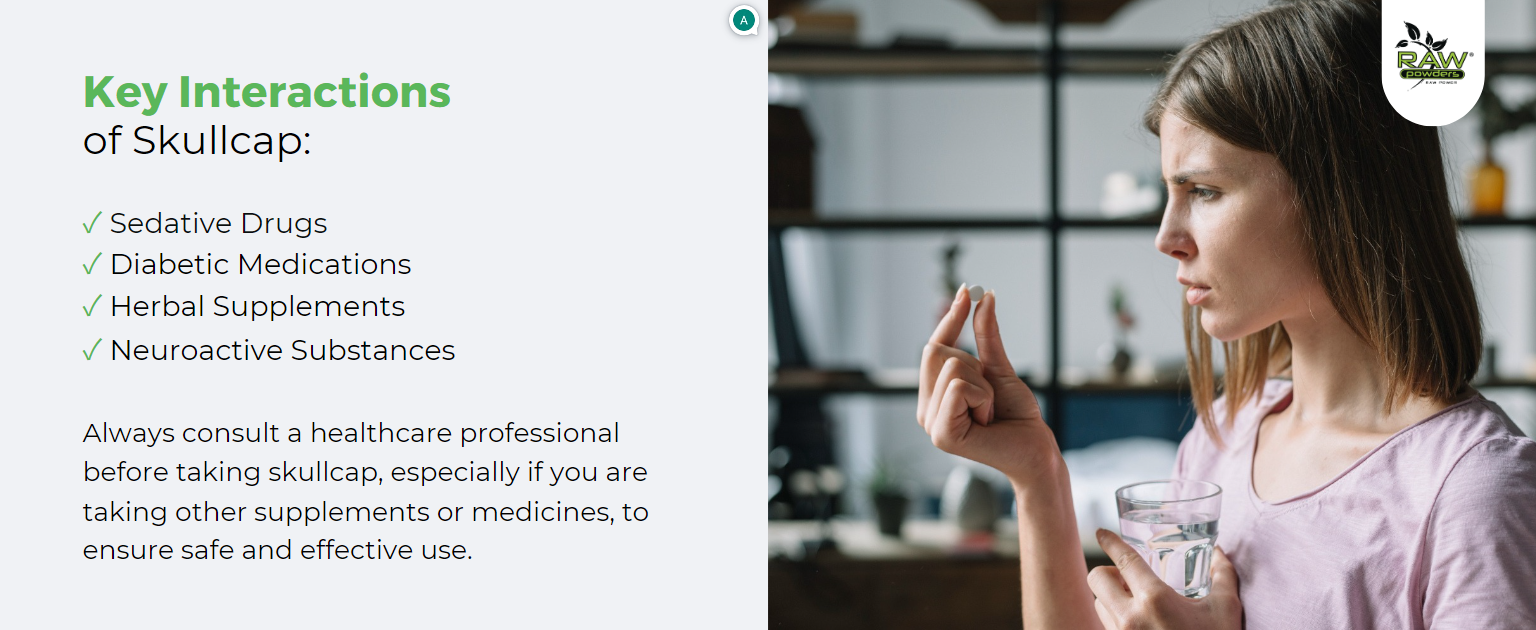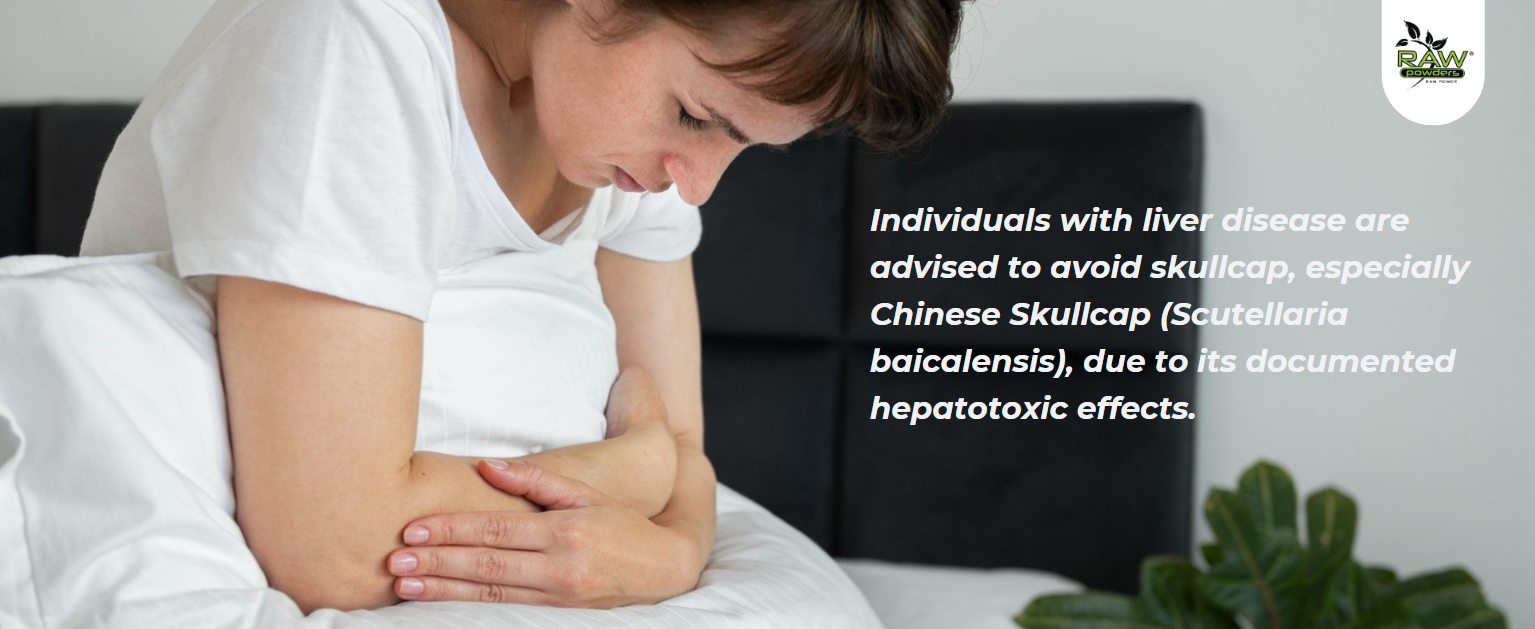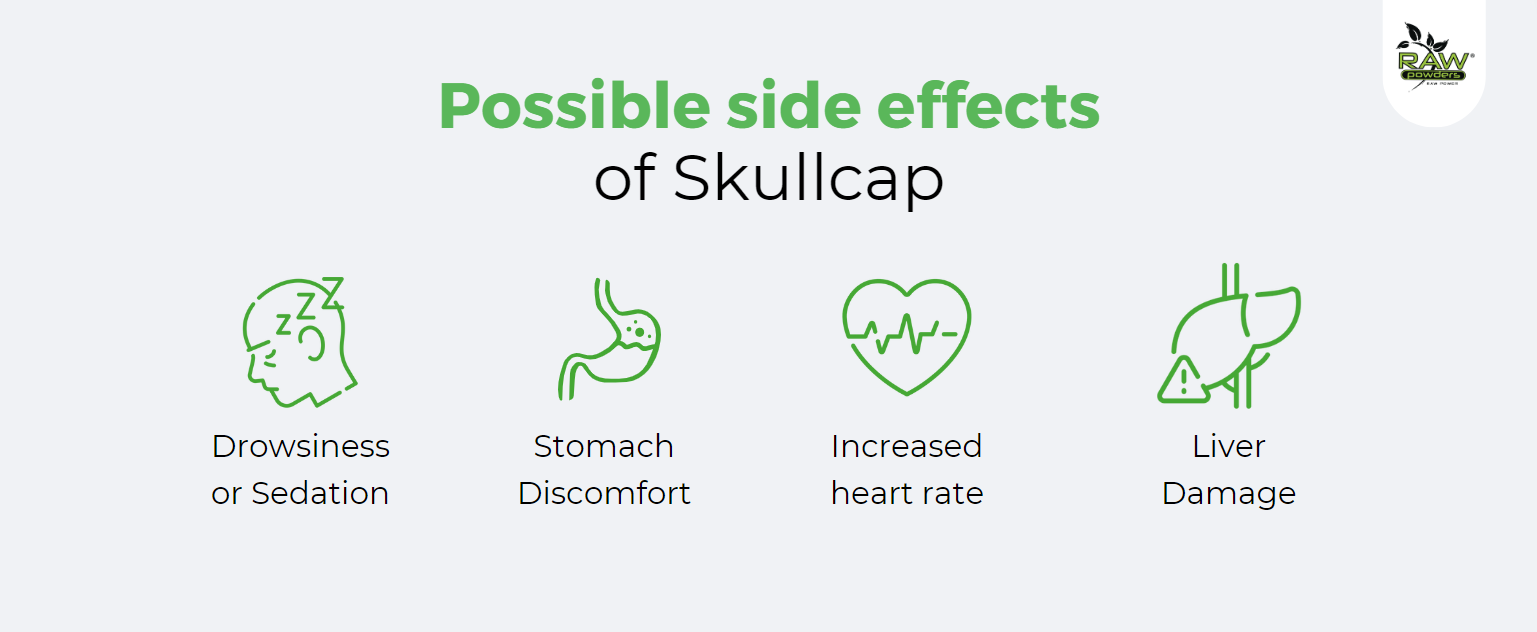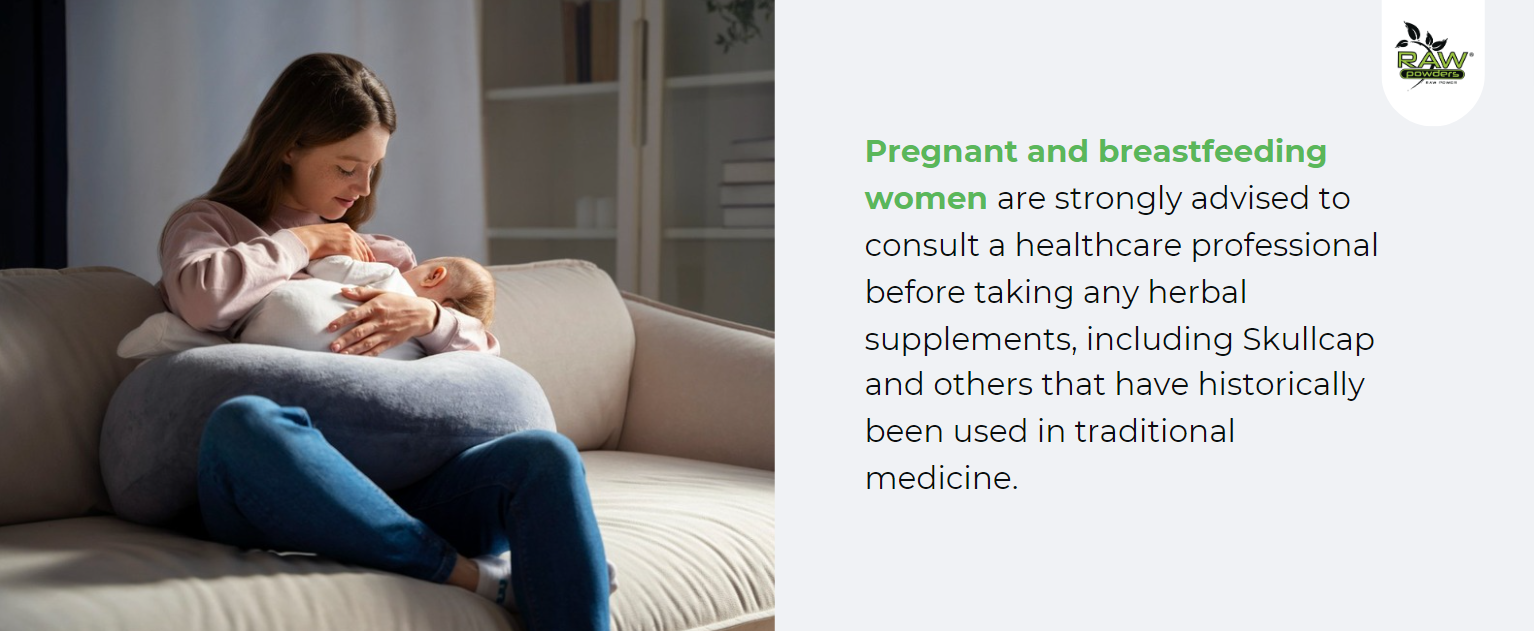SIDE EFFECTS OF SKULLCAP: A COMPREHENSIVE GUIDE


Skullcap is often praised for its therapeutic effects, but it is very important to look at a less discussed aspect of skullcap - the potential side effects. This article aims to shed light on the risks associated with the use of skullcap, emphasizing the importance of informed usage.
Skullcap, available primarily in two forms - American skullcap (Scutellaria lateriflora) and Chinese skullcap (Scutellaria baicalensis), has a storied history in herbal medicine. Traditionally used for its sedative and anti-inflammatory properties, it has found its way into many contemporary wellness routines. However, the flip side of its popularity is the range of side effects that users need to be aware of.
Potential Side Effects of Skullcap
It's crucial to note that individual responses to Skullcap can vary based on health conditions and the specific form of skullcap used. The majority of studies suggest that while skullcap can be beneficial, it should be used with caution, especially in individuals with pre-existing health conditions and when used in combination with other medications. As always, consulting with a healthcare professional before using skullcap or any herbal supplement is advisable.
The potential side effects of skullcap (Scutellaria species), which range from mild to severe, have been explored in various research studies. It's important to note that the frequency and severity of these side effects can vary based on individual health conditions and the form of skullcap used.
1. Drowsiness or Sedation.
Skullcap has been traditionally used for its sedative properties. One study highlights the anxiolytic and mood-enhancing effects of American skullcap (Scutellaria lateriflora) without notable side effects or reduction in energy or cognition. In a placebo-controlled, double-blind, crossover study, 43 healthy participants were randomised to a sequence of three times daily S. lateriflora (350 mg) or placebo, each over two weeks.[1].
2. Stomach Discomfort.
While specific studies focusing on skullcap's impact on gastrointestinal discomfort are limited, other Scutellaria species have shown potential in reducing gastrointestinal toxicity induced by certain drugs, as seen in a study on a traditional Chinese medicine formula containing skullcap [2].
3. Heart Palpitations.
Research directly linking skullcap to heart palpitations is scarce. However, it's important to exercise caution, particularly in individuals with pre-existing heart conditions.
4. Liver Damage.
- There have been reports of liver damage associated with the use of Chinese skullcap (Scutellaria baicalensis). A case of acute hepatitis was linked to the ingestion of Chinese skullcap, highlighting the risk of hepatotoxicity, especially in cases of overuse or pre-existing liver conditions [3].
- Another case report documented drug-induced liver injury and pulmonary infiltrates following the intake of a supplement containing Chinese skullcap, suggesting a connection between the herb and significant hepatotoxicity, although these instances are rare [4].
- On the other hand, a safety study states that single oral doses of 100-2800 mg of baicalein, one of the main flavonoids in Chinese skullcap, were safe and well tolerated by healthy subjects. Clinical laboratory assessments showed no signs of toxicity in the liver or kidney. It is safe to note that the favorable safety profile and pharmacokinetic properties warrant further clinical studies for baicalein [5].
- Also one more human study pre- and post-supplementation serum assays of alanine transaminase, aspartate transaminase, alkaline phosphatase and bilirubin were carried out in 17 patients of average age 38.6 years who had each taken 1335 mg dried root daily for an average of 444 days. None of the changes was statistically significant; indeed, three of the four parameters showed a non-significant decrease over time. Furthermore, none manifested clinical symptoms or signs of hepatic dysfunction during Scutellaria supplementation. According to the authors opinion these results suggest that daily intake of a relatively high level of Scutellaria baicalensis for over a year is not associated with any biochemical or clinical evidence of hepatic dysfunction. Indeed, Scutellaria baicalensis has been shown in murine experiments to have hepatoprotective actions [6].
- Moreover, findings suggested that baicalein exhibits the ability to prevent liver from APAP-induced liver injury and provided an underlying molecular basis for potential applications of baicalein to cure liver injuries [7].
5. Neurological Symptoms.
Although specific studies on skullcap causing neurological symptoms such as confusion or seizures are limited, its use has been traditionally linked to anxiety and related disorders. A study on American skullcap suggested its potential as a safe, well-tolerated alternative for these conditions with minimal side effects [8].
Several clinical studies and case reports have explored the side effects of skullcap (Scutellaria species), focusing on their severity and association with various health conditions:
- Impact on Allergic Responses.
Skullcap has been studied for its effects on allergic responses. One study demonstrated that skullcap extract attenuated food allergy symptoms in a mouse model by regulating systemic immune responses [9].
- Adulteration and Quality Concerns.
The adulteration of skullcap with other species, such as Teucrium spp., which contains hepatotoxic diterpenes, has been a concern. Studies have emphasized the need for proper authentication and quality assessment of skullcap-based supplements to ensure safety and efficacy [10].
- Variability in Effects and Safety.
The efficacy and safety of skullcap can vary significantly depending on preparation standards and the specific species used. While it is a staple in herbal medicine, clinical studies regarding its use are somewhat limited, indicating a need for more rigorous research [11].
To conclude, while skullcap has been associated with hepatotoxicity and other severe side effects, these occurrences are generally linked to high doses, improper use, or adulterated supplements. The herb's benefits and risks need to be weighed carefully, and its use should be guided by quality standards and proper medical advice.
For more on the benefits and dosage aspects of Skullcap, see the blog Skullcap Benefits, Skullcap Dosage.

Interactions with Medications and Other Herbs
Understanding the potential interactions of skullcap with various medications and herbal supplements is crucial, as these can lead to adverse effects and impact overall health and treatment efficacy. Here are some detailed examples of these interactions:
- Interaction with Sedative Drugs: Skullcap possesses natural sedative properties, which can be amplified when used in conjunction with pharmaceutical sedatives. This includes a broad range of drugs such as benzodiazepines (like Valium and Xanax), barbiturates, and certain types of antidepressants. When combined, these substances can significantly increase drowsiness and sleepiness. This heightened sedative effect might impair cognitive and motor functions, making activities like driving or operating heavy machinery particularly risky.
- Concurrent Use with Diabetic Medication: Skullcap may influence blood sugar levels. When used alongside diabetes medications, which are designed to regulate blood sugar, Skullcap can either potentiate or diminish the effectiveness of these drugs. This interaction poses a risk of causing hypoglycemia (low blood sugar) or hyperglycemia (high blood sugar), both of which can have serious health implications. It's important for individuals with diabetes to monitor their blood sugar levels closely if they choose to use Skullcap and consult with their healthcare provider for personalized advice.
- Combining with Other Herbal Supplements: Skullcap's interaction isn't limited to prescription medications; it can also interact with other herbal supplements, especially those that affect the liver or nervous system. For example, combining skullcap with other herbs known for their sedative properties (like valerian root or St. John’s wort) can intensify its sedative effects, leading to excessive drowsiness or other side effects. Furthermore, herbs that impact liver function, such as milk thistle or dandelion root, could alter the way skullcap is metabolized, potentially increasing the risk of liver-related side effects.
- Impact on the Nervous System: Skullcap's effects on the nervous system mean it should be used cautiously in combination with other neuroactive substances, including both prescription medications for neurological conditions and recreational substances. These combinations can unpredictably alter mood, cognition, and overall neurological function.
Also one review highlights that S. baicalensis promoted the anti-cancer effect of cisplatin and fluorouracil as well as affected pharmacokinetic profiles of numerous pharmaceutical drugs. It was shown that baicalein enhances anti-diabetic activity of metformin and it can sensitize the antibacterial effect of many antibiotics [12].
Due to these potential interactions, it’s always recommended to consult with a healthcare provider before adding skullcap to your regimen, particularly if you are taking other medications or herbal supplements. This ensures a tailored approach to your health, taking into account all possible interactions and their implications. Remember, even natural substances like herbs can have powerful effects and should be used responsibly.
Special Precautions and Warnings
Certain groups should exercise caution or avoid skullcap:
Pregnant or breastfeeding women, due to the lack of safety data.
While the Chinese skullcap has a history of use in traditional Chinese medicine for various purposes, including supporting pregnancy, it's crucial to approach such practices with caution. Traditional knowledge may not account for potential adverse effects, drug interactions, or other concerns that are better understood through modern scientific research.
In contemporary times, there is still limited scientific evidence regarding the safety and efficacy of Scutellaria baicalensis during pregnancy [13].
Therefore, it is strongly recommended that pregnant individuals consult with their healthcare provider before using any herbal supplements, including those with a historical background of use in traditional medicine. Healthcare providers can provide personalized advice based on the latest scientific knowledge and individual health circumstances.

Individuals with liver disease should avoid skullcap because of its potential hepatotoxic effects.
The caution regarding individuals with liver disease avoiding skullcap due to its potential hepatotoxic effects can be supported by case studies and research that have documented instances of liver injury associated with the use of skullcap, particularly Chinese Skullcap (Scutellaria baicalensis), which is often used in supplements. Here are relevant studies that support this caution:
Herbal Hepatotoxicity from Chinese Skullcap: This case report describes an elderly woman who developed significant cholestasis and hepatitis after taking a supplement containing Chinese skullcap among other ingredients. The patient's liver injury improved after discontinuation of the supplement, highlighting the potential hepatotoxic risk of Chinese skullcap [14].
Chinese Skullcap in Move Free Arthritis Supplement Causes Drug-Induced Liver Injury and Pulmonary Infiltrates: This case report discusses a patient who developed drug-induced liver injury following the intake of Move Free, an over-the-counter arthritis supplement containing Chinese skullcap. This report provides evidence that Chinese skullcap, included in the supplement, could be responsible for the adverse event, underscoring the need for caution among individuals with liver disease or at risk for liver injury [15].
These cases suggest a potential link between the use of skullcap, especially Chinese Skullcap, and hepatotoxicity, which could be of particular concern for individuals with pre-existing liver conditions. The hepatotoxic effects seem to be associated with specific formulations or combinations of herbs that include skullcap, indicating that the risk might not be isolated to skullcap alone but could be influenced by its interaction with other compounds or by the specific species of skullcap used.
Regulatory Status and Quality Control Issues
The regulatory status and quality control of skullcap supplements are critical factors that can significantly influence their safety and efficacy.
Varying Regulations Across Countries
The regulation of herbal supplements, including skullcap, varies significantly from one country to another. In some regions, such as the United States, herbal supplements are regulated as dietary supplements by the Food and Drug Administration (FDA) but are not subject to the same rigorous testing and approval processes as pharmaceutical drugs. This means that the safety, efficacy, and quality of these supplements are largely dependent on the manufacturers. In other countries, the regulations might be stricter or, conversely, even more lenient, leading to a wide disparity in product standards globally.
Quality Control Issues
Due to the relatively relaxed regulatory environment, especially in the dietary supplement market, there are concerns about the quality and purity of skullcap products. Issues such as contamination, adulteration, or misidentification are not uncommon. For instance, some skullcap supplements have been found to be contaminated with other related species like Germander, which can cause liver toxicity. Additionally, the concentration of active ingredients in skullcap can vary greatly between products and batches, leading to inconsistencies in their therapeutic effects and potential safety risks.
Conclusion
While skullcap can be a beneficial herbal supplement, understanding its potential side effects is essential for safe usage. Users should approach skullcap with caution, particularly if they belong to high-risk groups or are taking other medications. Consulting healthcare professionals before incorporating skullcap into a health regimen is strongly advised.
Medical Disclaimer
The information provided in our articles is solely for educational purposes and should not be considered medical advice or instruction. No action or inaction should be taken based solely on the contents of this information. Readers should consult their health care professional on any matter related to their health and well-being. The information and opinions provided here are believed to be accurate and sound, based on the best judgment available to the authors, but readers who fail to consult with appropriate health authorities assume the risk of any injuries. The publisher is not responsible for errors or omissions.
Please be aware that different countries may have specific regulations and that this disclaimer does not replace the need for consultation with a healthcare provider before beginning or changing a treatment or supplement regimen. The information contained in this article is not intended to diagnose, treat, cure, or prevent any disease. Individual results may vary.
References
- Brock, C. (2012). American skullcap (Scutellaria lateriflora L) : a study of its effects on mood in healthy volunteers. .
https://doi.org/10.1186/isrctn48078312. https://pubmed.ncbi.nlm.nih.gov/23878109/ - Lam, W., Bussom, S., Guan, F., Jiang, Z., Zhang, W., Gullen, E., Liu, S., & Cheng, Y. (2010). The Four-Herb Chinese Medicine PHY906 Reduces Chemotherapy-Induced Gastrointestinal Toxicity. Science Translational Medicine, 2, 45ra59 - 45ra59.
https://doi.org/10.1126/scitranslmed.3001270 https://pubmed.ncbi.nlm.nih.gov/20720216/ - Papafragkakis, C., Ona, M., Reddy, M., & Anand, S. (2016). Acute Hepatitis after Ingestion of a Preparation of Chinese Skullcap and Black Catechu for Joint Pain. Case Reports in Hepatology, 2016.
https://doi.org/10.1155/2016/4356749. https://pubmed.ncbi.nlm.nih.gov/27144042/ - Dhanasekaran, R., Owens, V., & Sanchez, W. (2013). Chinese Skullcap in Move Free Arthritis Supplement Causes Drug Induced Liver Injury and Pulmonary Infiltrates. Case Reports in Hepatology, 2013.
https://doi.org/10.1155/2013/965092. https://pubmed.ncbi.nlm.nih.gov/25431706/ - Min Li, Aixin Shi, Hongxian Pang, Wei Xue, Yang Li, Guoying Cao, Bei Yan, Fan Dong, Kexin Li, Wei Xiao, Guorong He, Guanhua Du, Xin Hu. Safety, tolerability, and pharmacokinetics of a single ascending dose of baicalein chewable tablets in healthy subjects. Clinical Trial J Ethnopharmacol. 2014 Oct 28:156:210-5. doi: 10.1016/j.jep.2014.08.031. Epub 2014 Sep 8. PMID: 25219601. https://pubmed.ncbi.nlm.nih.gov/25219601/
- Basant K. Puri, Nikita White, Jean A. Monro. The effect of supplementation with Scutellaria baicalensis on hepatic function. Med Hypotheses. 2019 Dec:133:109402. doi: 10.1016/j.mehy.2019.109402. Epub 2019 Sep 19. PMID: 31557595. https://pubmed.ncbi.nlm.nih.gov/31557595/
- Hong-Chao Zhou, Hui Wang, Kun Shi, Jian-Ming Li, Ying Zong, Rui Du. Hepatoprotective Effect of Baicalein Against Acetaminophen-Induced Acute Liver Injury in Mice. Molecules. 2018 Dec 31;24(1):131. doi: 10.3390/molecules24010131. PMID: 30602693 PMCID: PMC6337302. https://pubmed.ncbi.nlm.nih.gov/30602693/
- Brock, C., Whitehouse, J., Tewfik, I., & Towell, T. (2010). American skullcap (Scutellaria lateriflora): an ancient remedy for today’s anxiety?. British Journal of Wellbeing, 1, 25-30. https://doi.org/10.12968/BJOW.2010.1.4.49168.
- Shin, H., Bae, M., Jung, S., & Shon, D. (2014). Preventive effects of skullcap (Scutellaria baicalensis) extract in a mouse model of food allergy.. Journal of ethnopharmacology, 153 3, 667-73
https://doi.org/10.1016/j.jep.2014.03.018. https://pubmed.ncbi.nlm.nih.gov/24637193/ - Sun, J., & Chen, P. (2011). A flow-injection mass spectrometry fingerprinting method for authentication and quality assessment of Scutellaria lateriflora-based dietary supplements. Analytical and Bioanalytical Chemistry, 401, 1577-1584. https://doi.org/10.1007/s00216-011-5246-2. https://pubmed.ncbi.nlm.nih.gov/21773734/
- Upton, R., & DAyu, R. (2012). Skullcap Scutellaria lateriflora L.: An American nervine. Journal of Herbal Medicine, 2, 76-96. https://doi.org/10.1016/J.HERMED.2012.06.004.
- Xian Zhou, Ling Fu, Pengli Wang, Lan Yang, Xiaoshu Zhu, Chun Guang Li. Drug-herb interactions between Scutellaria baicalensis and pharmaceutical drugs: Insights from experimental studies, mechanistic actions to clinical applications. Review Biomed Pharmacother. 2021 Jun:138:111445. doi: 10.1016/j.biopha.2021.111445. Epub 2021 Mar 10. PMID: 33711551. https://pubmed.ncbi.nlm.nih.gov/33711551/
- Dan-na Fang, Chang-wu Zheng, Ye-ling Ma. Effectiveness of Scutellaria baicalensis Georgi root in pregnancy-related diseases: A review. Journal of Integrative Medicine, Volume 21, Issue 1, January 2023, Pages 17-25. DOI: org/10.1016/j.joim.2022.09.005. https://www.sciencedirect.com/science/article/pii/S2095496422001078?via%3Dihub
- Leslie Yang, Andrew Aronsohn, John Hart, and Donald Jensen. Herbal hepatoxicity from Chinese skullcap: A case report. Journal List World J Hepatol v.4(7); 2012 Jul 27 PMC3409358. doi: 10.4254/wjh.v4.i7.231. https://www.ncbi.nlm.nih.gov/pmc/articles/PMC3409358/
- Renumathy Dhanasekaran, Victoria Owens, William Sanchez. Chinese skullcap in move free arthritis supplement causes drug induced liver injury and pulmonary infiltrates. Case Reports Hepatol. 2013:2013:965092. doi: 10.1155/2013/965092. Epub 2013 Apr 14. PMID: 25431706 PMCID: PMC4238172. https://pubmed.ncbi.nlm.nih.gov/25431706/





_front%20(1)-250x250.png)



_front%20(1)-250x250.png)

-(NN)_front%20(1)-min-250x250.png)

_front%20(1)-250x250.png)


_front%20(1)-min-250x250.png)
_front%20(1)%20(1)-250x250.png)
_front%20(1)%20(1)-250x250.png)
_front%20(1)-min-250x250.png)
_front%20(1)-min-250x250.png)
_front%20(1)%20(1)-250x250.png)
_front%20(1)%20(1)-250x250.png)



